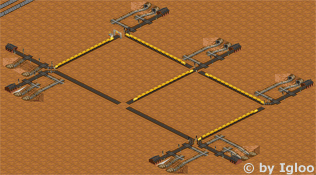Stochastic Networks
You will probably have seen, or participated, in the last Public server game, which was all about logic. I’ll try to explain it in a bit.
After recent interests in self-regulating construction, there was an attempt to improve the usability of such designs. We have already seen self-regulating networks, where dummy trains transfer cargo onto ML trains, and recently self-regulating orders where vehicles could potentially go to all stations. What has not yet been done is to apply a form of regulation to point-to-point passenger games.
